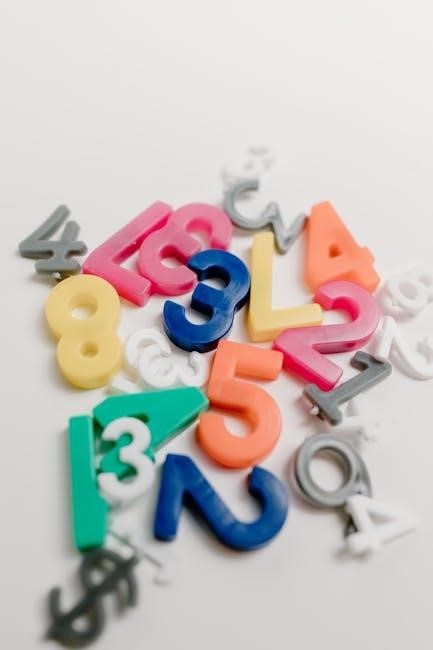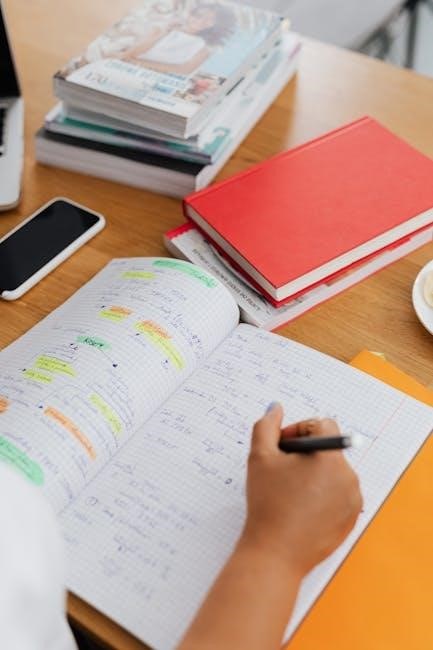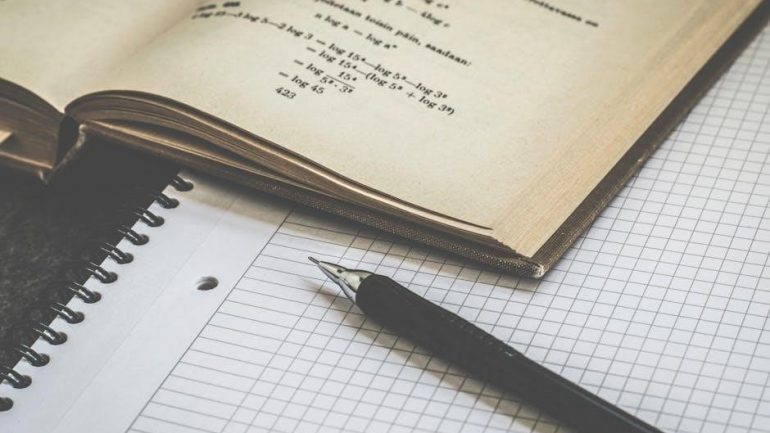A comprehensive GCSE Mathematics revision guide is essential for students to master the curriculum, covering key topics like Number, Algebra, and Graphs. It provides structured resources, including practice questions, step-by-step explanations, and exam-style problems, ensuring students can revise effectively and build confidence for success.
Overview of the GCSE Mathematics Curriculum
The GCSE Mathematics curriculum is designed to develop foundational mathematical skills and problem-solving abilities. It is divided into Higher and Foundation tiers, catering to different student abilities. Key topics include Number, Algebra, Geometry, Statistics, and Ratio, Proportion, and Rates. The curriculum emphasizes practical applications of maths in real-world scenarios. Students explore concepts through structured lessons, with a focus on building logical reasoning and analytical thinking. Regular assessments and practice papers help track progress. The syllabus is comprehensive, ensuring students gain a solid understanding of mathematical principles. Resources like revision guides and workbooks align with the curriculum, providing targeted practice for exam success. By mastering the curriculum, students develop skills essential for further education and future careers.

Importance of a Structured Revision Guide
A structured revision guide is crucial for GCSE Mathematics success. It provides clear explanations, concise notes, and focused practice questions, helping students navigate the syllabus efficiently. By organizing content into manageable sections, revision guides ensure students cover all topics without feeling overwhelmed. They offer step-by-step solutions and exam-style questions, familiarizing students with the test format. Regular use of a revision guide enhances understanding, identifies weaknesses, and builds confidence. Additionally, it serves as a quick reference for last-minute review, ensuring students are well-prepared for their exams. A good guide aligns with the curriculum, making it an invaluable resource for both classroom and independent study. Investing time in a structured revision guide significantly improves retention and performance, making it a cornerstone of effective revision strategies.

Key Components of a GCSE Mathematics Revision Guide
A comprehensive revision guide includes concise explanations, practice questions, and step-by-step solutions. It covers key topics like Number, Algebra, and Graphs, with varying question styles and exam-style problems.
Revision Guides vs. Workbooks: What’s the Difference?
Revision guides and workbooks serve distinct purposes in GCSE Mathematics preparation. Revision guides provide concise explanations of key topics, such as Number, Algebra, and Graphs, along with activity types that reinforce understanding. Workbooks, on the other hand, focus on extensive practice, offering a variety of question styles, including exam-style problems, to help students apply their knowledge. While revision guides are ideal for reviewing concepts, workbooks are better suited for honing problem-solving skills. Together, they create a balanced approach to revision, ensuring students grasp both the theory and its practical application. By combining these resources, students can systematically build confidence and mastery of the curriculum.
Best Practices for Using Revision Materials Effectively

To maximize the effectiveness of GCSE Mathematics revision materials, students should adopt a structured and consistent approach. Start by creating a detailed study schedule, allocating specific time slots for each topic. Prioritize understanding core concepts over rote learning, as this fosters long-term retention. Use revision guides for concise explanations and workbooks for hands-on practice, ensuring a balance between theory and application. Regularly test yourself with past papers to simulate exam conditions and identify weaknesses. Review mistakes immediately, as this reinforces learning. Utilize online platforms for interactive exercises and video solutions to deepen understanding. Stay organized by categorizing notes and questions by topic, making revision more efficient. Finally, take short breaks to maintain focus and avoid burnout. By integrating these strategies, students can optimize their revision process and achieve their full potential in GCSE Mathematics.

Understanding the GCSE Mathematics Syllabus
The GCSE Mathematics syllabus covers core topics like Number, Algebra, Geometry, and Statistics, providing a clear framework for building essential mathematical skills and problem-solving abilities.

Breaking Down the Syllabus into Manageable Topics
Breaking down the GCSE Mathematics syllabus into manageable topics is crucial for effective revision. Start with core areas like Number, covering operations, fractions, and decimals. Move on to Algebra, focusing on equations, formulas, and sequences. Geometry and Measures involve understanding shapes, angles, and perimeter calculations. Finally, Statistics and Probability cover data analysis and probability concepts. Organizing study materials and focusing on one topic at a time helps build a strong foundation. Utilize revision guides and workbooks for structured practice, ensuring each section is thoroughly understood before moving on. This approach ensures comprehensive preparation and reduces exam stress. Regular practice and review of past papers also reinforce learning and improve problem-solving skills.
Focus Areas for Higher and Foundation Tiers
The GCSE Mathematics syllabus is divided into Higher and Foundation tiers, each requiring tailored focus. For the Higher Tier, emphasis is placed on advanced topics like algebraic manipulation, complex geometry, and higher-level statistics. Students should prioritize mastering quadratic equations, trigonometry, and calculus concepts. In contrast, the Foundation Tier focuses on core skills, such as number operations, basic algebra, and foundational statistics. Key areas include ratio, proportion, and probability. Revision guides often provide tier-specific resources, ensuring students target their strengths and weaknesses effectively. Regular practice with past papers and workbooks helps reinforce understanding. By addressing tier-specific challenges, students can achieve their full potential in the exam. Structured revision plans and interactive resources further support tailored learning for both tiers.

Effective Revision Strategies for GCSE Maths
Active learning techniques, such as solving practice papers and engaging with interactive resources, enhance retention and exam readiness. Regular review and focused practice are key to success.
Creating a Personalised Revision Plan
A tailored plan ensures students focus on their weaknesses and strengths, optimizing study time. Start by assessing knowledge gaps through practice tests, then allocate time to each topic based on difficulty. Incorporate active learning techniques like solving past papers and using online resources. Regular breaks and progress tracking maintain motivation. Prioritize foundational concepts to build confidence before tackling advanced topics. Utilize revision guides and workbooks for structured practice, aligning with the syllabus. Set realistic goals and review schedules to avoid burnout. Adjust the plan as needed to reflect progress and changing needs. Consistency and adaptability are key to achieving success in GCSE Mathematics.
Active Learning Techniques for Better Retention
Engaging with material actively enhances retention and understanding in GCSE Mathematics. Techniques like solving practice papers, using online platforms, and creating concept maps help students interact deeply with content. Self-quizzing and teaching others reinforce learning, while interleaved practice strengthens problem-solving skills. Regularly reviewing mistakes and seeking feedback improves accuracy. Incorporating real-world applications makes abstract concepts more relatable. Active learning fosters a deeper connection with the material, ensuring better long-term retention and exam readiness.
The Role of Practice Papers in Revision
Practice papers are a cornerstone of GCSE Mathematics revision, offering students realistic exam experiences. They help identify weaknesses, improve time management, and build familiarity with question formats. Regular use of past papers and mock tests allows students to apply knowledge under timed conditions, enhancing exam readiness. Detailed solutions enable learners to review mistakes, while video solutions provide additional guidance. Incorporating practice papers into revision routines ensures comprehensive preparation and boosts confidence, crucial for achieving success in the actual exams. This approach aligns with structured guides and workbooks, creating a well-rounded revision strategy tailored to individual needs and exam board specifications. By simulating real test conditions, practice papers play a vital role in refining problem-solving skills and reducing anxiety, ultimately leading to better performance. They are an indispensable tool for every student aiming to excel in their GCSE Mathematics exams.

Recommended Resources for GCSE Maths Revision
Top-rated revision guides for Edexcel, AQA, and OCR, along with comprehensive workbooks and online platforms, provide students with structured and interactive resources to excel in their GCSE Mathematics exams.
Top-Rated Revision Guides for Edexcel, AQA, and OCR
For Edexcel, AQA, and OCR students, CGP’s GCSE Mathematics Revision Guides are highly recommended, offering clear explanations and practice questions tailored to each exam board. The Edexcel International GCSE Mathematics Revision Guide covers Specification A with detailed examples and step-by-step solutions. Pearson’s Revision Guides include video solutions and online resources, while Oxford’s Revise series provides concise notes and exam-style questions. These guides cater to both Higher and Foundation tiers, ensuring comprehensive coverage of the syllabus. With features like free online editions and interactive tools, they support both classroom and independent learning. Students can also find workbooks and revision cards for focused practice, making these resources indispensable for achieving success in GCSE Mathematics exams.
Workbook Recommendations for Comprehensive Practice
Workbooks are essential for GCSE Mathematics revision, offering extensive practice across the syllabus. The New Edexcel International GCSE Maths Workbook includes over 160 problems, split into 20 key units, ensuring thorough preparation. CGP’s Higher Level Complete Revision & Practice book combines concise explanations with varied question styles, while Pearson’s Exam Practice Assistant connects print and online resources seamlessly. These workbooks feature exam-style questions, detailed examples, and step-by-step instructions, catering to both Higher and Foundation tiers. They are designed for independent study and classroom use, providing students with the tools to master all areas of the curriculum. Regular practice with these resources helps build confidence and ensures a deep understanding of key topics, making them a vital part of any revision strategy.
Online Platforms for Interactive Revision
Online platforms have revolutionized GCSE Mathematics revision, offering interactive tools for effective practice. Pearson’s Exam Practice Assistant is a standout resource, blending print and digital revision seamlessly. It provides access to exam-style questions, video solutions, and progress tracking, making it ideal for self-assessment. Additionally, CGP offers digital versions of their revision guides, complete with interactive exercises and quizzes. Websites like GCSE Maths Resources provide free revision guides, practice papers, and interactive lessons tailored for Edexcel, AQA, and OCR syllabi. These platforms are designed to engage students with dynamic content, helping them grasp complex concepts through visual aids and real-time feedback. Regular use of these tools ensures a well-rounded understanding and improved performance in exams. They are particularly useful for independent learners seeking structured and engaging revision materials.

Overcoming Common Challenges in GCSE Maths

Proactively addressing weaknesses and using targeted practice papers can help students overcome common challenges in GCSE Maths. Regular review and seeking support are key to building confidence and mastery.
Identifying and Addressing Weaknesses
Identifying weaknesses is crucial for effective revision. Start by analyzing past exam papers and practice tests to pinpoint areas where you struggle. Focus on understanding common errors and misconceptions. Use revision guides and workbooks that provide detailed explanations and step-by-step solutions. For example, resources like CGP Revision Guides offer clear, student-friendly explanations of complex topics. Additionally, online platforms such as Pearson Revises provide interactive tools and video solutions to help clarify difficult concepts. Regularly reviewing these resources and practicing targeted questions can help address weaknesses systematically. Consistent practice and seeking support from teachers or tutors when needed are essential for overcoming challenges and achieving success in GCSE Mathematics.
Time Management Tips for Revision and Exams
Effective time management is vital for successful revision and exam performance. Create a structured revision timetable, allocating specific times for each topic and ensuring a balance between study and breaks. Prioritize challenging areas and dedicate extra time to mastering them. During exams, allocate time wisely for each question, ensuring you attempt all parts. Practice papers are invaluable for improving time management skills, as they simulate real exam conditions. Utilize active learning techniques, such as the Pomodoro Technique, to maintain focus and productivity. Regularly review progress and adjust your schedule as needed. By staying organized and consistent, students can maximize their revision efficiency and perform at their best in exams. Remember, consistent practice and strategic planning are key to achieving success in GCSE Mathematics.
A well-structured GCSE Mathematics revision guide is key to exam success. By combining focused study, practice papers, and effective time management, students can build confidence and achieve their goals.
Final Tips for Success in GCSE Mathematics
To excel in GCSE Mathematics, students should adopt a disciplined approach; Prioritize understanding over rote learning, focusing on weak areas through targeted practice. Utilize revision guides and workbooks for structured study, and regularly attempt past papers to simulate exam conditions. Active learning techniques, such as teaching concepts to others or creating self-test quizzes, enhance retention. Consistency is key; establish a study routine and stick to it. Additionally, seeking support from teachers or online resources can address specific challenges. Staying organized and maintaining a positive mindset throughout the revision process will significantly boost confidence and performance. Remember, effective preparation leads to success in GCSE Mathematics.
Staying Motivated Throughout the Revision Process
Maintaining motivation during GCSE Mathematics revision is crucial for success. Set clear, achievable goals and celebrate progress, no matter how small. Incorporate active learning techniques, such as solving problems aloud or explaining concepts to others, to stay engaged. Utilize interactive resources like online platforms or video tutorials to make study sessions more dynamic. Establishing a consistent study routine and creating a dedicated workspace can also enhance focus. Surround yourself with a supportive environment, whether through study groups or family encouragement. Remember, motivation often comes from seeing improvement, so track your progress and reflect on how far you’ve come. By staying positive and embracing challenges as opportunities to grow, you’ll maintain the drive needed to excel in your GCSE Mathematics journey.




